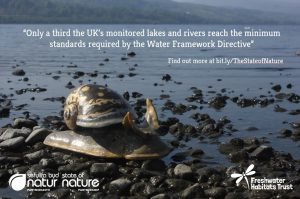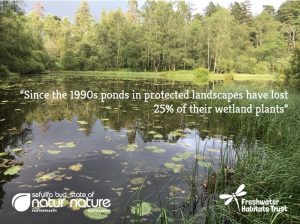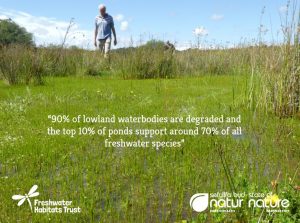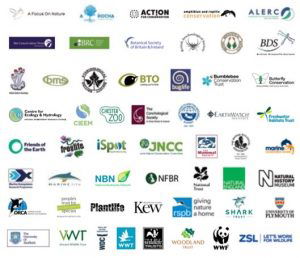No let-up in the net loss of nature, and that includes ponds too!
4th October 2019
The UK’s wildlife continues to decline according to the State of Nature 2019 report. The latest findings show that since rigorous scientific monitoring began in the 1970s, there has been a 13% decline in average abundance across wildlife studied, and that the declines continue unabated.
It’s not just the habitats and species highlighted in the State of Nature report: Freshwater Habitats Trust’s own work, through the National Lottery Heritage Funded ‘People Ponds and Water’ project, has highlighted the shocking state of Britain’s ponds and the species they support.
We’ve evidenced the ongoing decline of Britain’s highest quality ponds, which are critical hotpots for freshwater biodiversity. Since the 1990s, ponds in protected landscapes have lost 25% of their wetland plants. Two-thirds of these high quality ponds lost a significant number of plant species and a disproportionate number of uncommon species over the c.25 years between our surveys. High quality ponds in Wales retained more of their species, but similar losses were recorded in the number of uncommon plants.
PondNet surveys of wider countryside ponds, outside of nature reserves, also revealed a worrying picture of the state of pond biodiversity. The average total number of wetland plants recorded per pond was less than half of the total from high quality pond sites. In the survey, less than 1% of wider countryside ponds were found to support an uncommon plant species, compared to 78% of high quality pond sites.
Following the State of Nature reports in 2013 and 2016, leading professionals from more than 70 wildlife organisations have joined with government agencies for the first time, to present the clearest picture to date of the status of our species across land and sea.
Much is known about the causes of decline and some of the ways in which we could reduce negative impacts and help struggling species. The evidence from the last 50 years shows that significant and ongoing changes in the way we manage our land for agriculture, and the ongoing effects of climate change, are having the biggest impacts on nature.
Pollution is also a major issue. Whilst emissions of many pollutants have been reduced dramatically in recent decades, pollution continues to have a severe impact on the UK’s sensitive habitats and freshwaters, and new pollutant threats are continuing to emerge.
Daniel Hayhow, lead author on the State of Nature report, said “We know more about the UK’s wildlife than any other country on the planet, and what it is telling us should make us sit up and listen. We need to respond more urgently across the board if we are to put nature back where it belongs. Governments, conservation groups and individuals must continue to work together to help restore our land and sea for wildlife and people in a way that is both ambitious and inspiring for future generations”
“In this report we have drawn on the best available data on the UK’s biodiversity, produced by partnerships between conservation NGOs, research institutes, UK and national governments, and thousands of dedicated volunteers. It’s through working together that we can help nature recover but the battle must intensify.”
Whilst the data that the report shows are alarming, there is also cause for some cautious hope. The report showcases a wide range of exciting conservation initiatives, with partnerships delivering inspiring results for some of the UK’s nature. Species such as Bitterns and Large Blue Butterfly have been saved through the concerted efforts of organisations and individuals.
Reflecting growing concern about the environmental and climate emergencies, public support for conservation also continues to grow, with NGO expenditure up by 26% since 2010/11, and time donated by volunteers having increased by 40% since 2000. However, public sector expenditure on biodiversity in the UK, as a proportion of GDP, has fallen by 42% since a peak in 2008/09.
The State of Nature report has a foreword by a collective of young conservationists who are passionate about conservation and the future of our wildlife and nature to preserve it for future generations.
Sophie Pavelle, a young conservationist said “What a huge wake-up call 2019 has been! I have felt the loss of nature more acutely this year than any other. A dawn chorus less deafening, hedgerows less frantic, bizarre, worrying weather…it seems that in a more complex world nature is tired, muted and confused. People protect what they love, and if we can find quirky, empowering ways to encourage young people to connect with nature emotionally and see it as something they can truly champion – only then can we dig deep to find real hope for a brighter, sustained future for our natural world.”
To find out more click on the image in the gallery below




